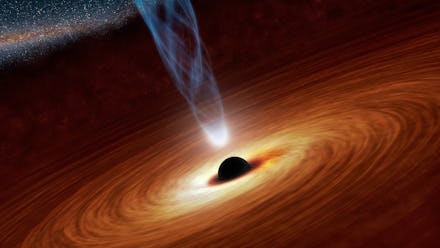Einstein's Famous Prediction About Gravitational Waves May Finally Be Proven Right

One of the biggest mysteries in modern physics may have just been solved.
The scientific community is abuzz with rumors that physicists have finally detected gravitational waves, fluctuations in the curvature of space-time that move at the speed of light throughout the galaxy.
Noted physicist Albert Einstein first predicted them in 1916, theorizing they might explain how mass affects the very fabric of space-time.
Now, partially thanks to a tweet from theoretical physicist Lawrence Krauss, physicists have begun speculating that researchers at Louisiana's Laser Interferometer Gravitational-Wave Observatory successfully detected such waves from the collision of two black holes last year and have had their results independently confirmed by other experts, reports ArsTechnica UK.
The anticipation has now increased even further, with Tech Insider reporting Columbia University will host a "major" event on Feb. 11, billed as connected to LIGO's research. Further leaked emails from McMaster University and Perimeter Institute for Theoretical Physics scientist Cliff Burgess offered even more concrete details of the rumored study.
The discovery of the gravitational waves would be one of the biggest discoveries in physics in history, confirming Einstein's theory.
Gravitational waves "are the most elusive and one of the most interesting phenomena predicted by [Einstein's] general theory of relativity," explains the University Observer. "In theory, gravitational waves are produced by cataclysmic events, for example by the merger of two black holes ... What scientists really want to detect is a 'chirp'; the signature of two black holes spiraling toward each other. These would emit waves that increase in pitch and volume over time."
Part of the challenge is that by the time such waves arrive on Earth, they are nearly undetectable, Gizmodo writes — on the order of a billionth of the diameter of an atom. You need ridiculously precise instruments operating in completely noise-free environments to measure them, and until very recently, our detectors simply haven't been up to snuff."
LIGO may be up to snuff. However, its lead researcher Joe Giaime told ArsTechnica, all the hubbub might be premature.
"We're really kind of old school," he told the site. "We analyze our data. If there's anything interesting we write it up in papers. We send the papers to the journals. If and only if there's an interesting discovery that passes muster, and it has been accepted for publication by a journal, then we blab about it. Anything before that, you're not going to get anything out of me."
According to the Observer, other possibilities include that the team was mistaken or picked up on a false positive intentionally inserted to test the scientists' readiness — but with the announcement just days away, whoever did so may be running out of time to clue in the researchers at LIGO.